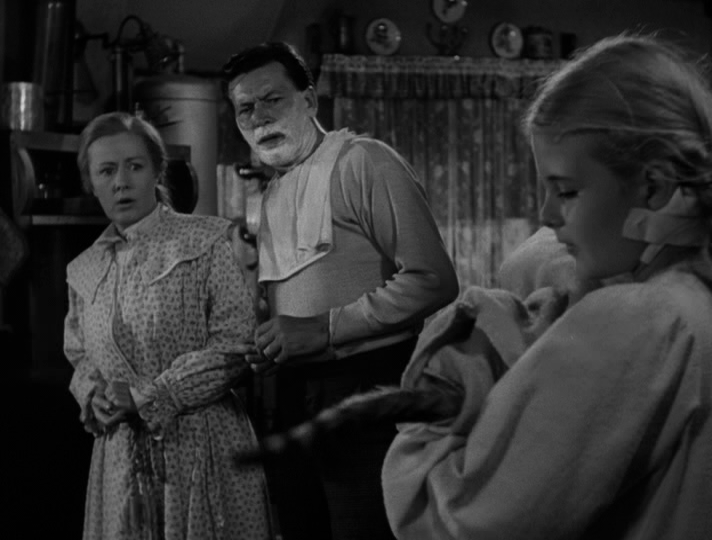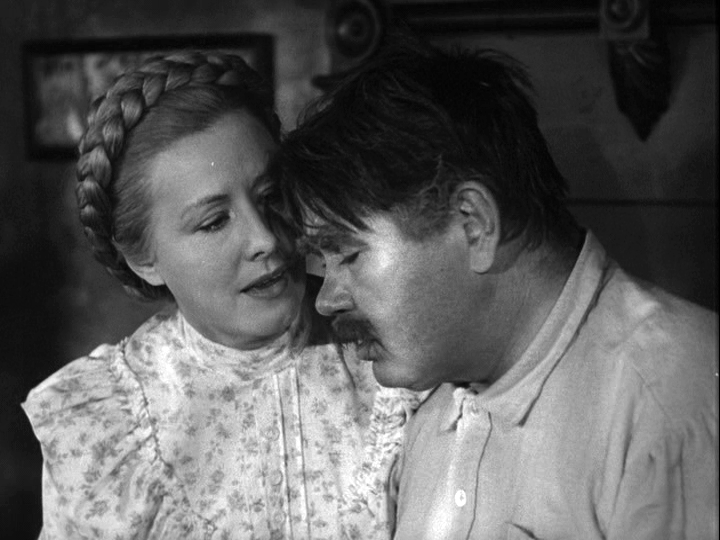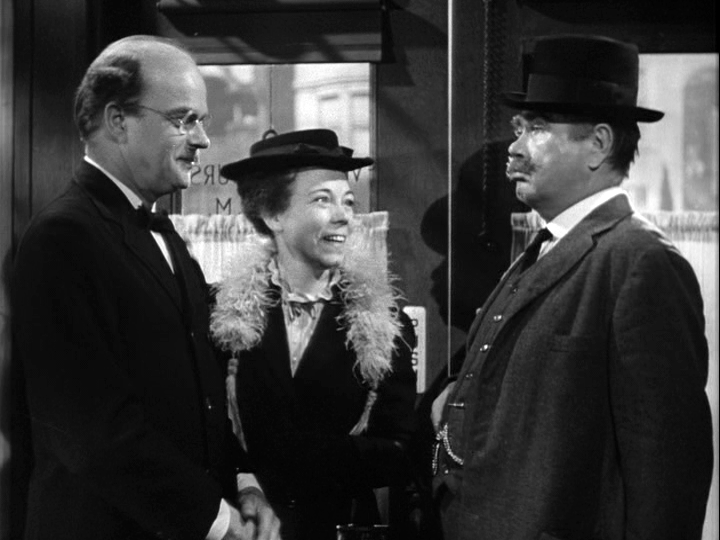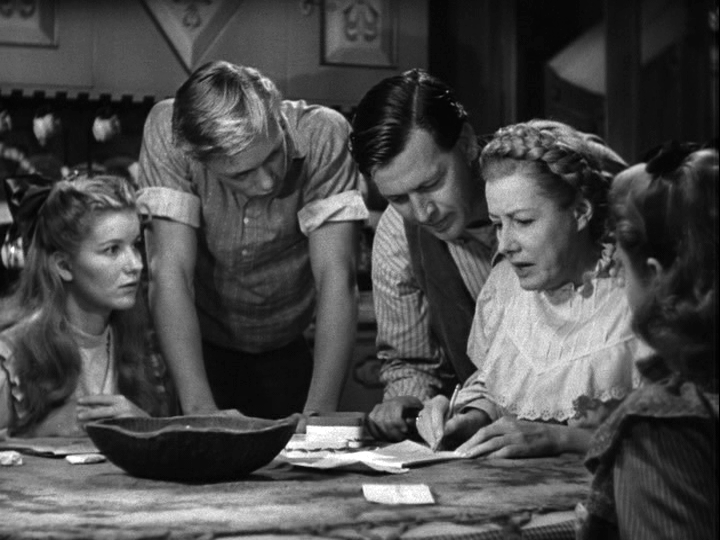I Remember Mama, 1948, RKO Radio Pictures. Starring Irene Dunne, Barbara Bel Geddes, Oskar Homolka, Ellen Corby, Philip Dorn. Directed by George Stevens. B&W, 134 minutes.
With quiet dignity, wry humor and deep devotion, Marta Hanson (Irene Dunne), a Norwegian immigrant, is raising her family in early 20th century San Francisco. Her story is told in flashback vignettes by her oldest daughter, Katrin (Barbara Bel Geddes), who has just finished writing an autobiographical novel based on her family.
Mama manages not only her home, but the bickering and rivalry among her sisters and uncle Chris (Oskar Homolka). Chris scares everyone, it seems, with his boisterous manner and demanding presence. Yet he’s clearly wounded to learn he’s frightening his youngest family members—Marta’s children—and seeks camaraderie with them, which he creates by leaning in and whispering a shared secret: none of them like Marta’s sisters.
Mama puts her family first, and the children believe she can do anything, even bring the dying family cat back to life. When she inadvertently does just that, she frets that she should tell the family the truth—she simply failed to give the cat enough chloroform, and the deep sleep healed him—but it wouldn’t matter. Her children have absolute faith in her, and with good reason.

Irene Dunne, Philip Dorn, June Hedin (and Uncle Elizabeth the miracle cat)
This is a nostalgic, sentimental tale, evocative and untroubled. It is near-perfect storytelling, with a stellar cast and fine direction.
Filming went smoothly for this film; Dunne and director George Stevens enjoyed a good working relationship. In a 1979 interview, Dunne recalled that Stevens once told her, “you always give me just a little more than I ask for” saying that was the greatest compliment she had ever received.
She also remembered with gratitude another comment the director had made. Each day she drove into work wearing white driving gloves, she said, and after a scene in I Remember Mama in which she was scrubbing the floor, Stevens told her, “for a woman who wears gloves you sure know how to scrub a floor.”

Irene Dunne, Oskar Homolka
I Remember Mama was nominated for five Academy Awards: Best Actress in a Leading Role (Dunne), Best Actor in a Supporting Role (Homolka), Best Actress in a Supporting Role (Bel Geddes and Corby), and Best Cinematography, Black-and-White.
Uncharacteristically for the time, many of the exterior scenes were shot on location in San Francisco. A train carrying more than 160 crew members, actors and actresses traveled to the city, along with costumes, props, makeup, camera equipment and whatever else was needed for shooting.

Edgar Bergen, Ellen Corby, Oskar Homolka
This was the fifth and last Oscar nomination for Dunne. She won none, but in 1985 received the Kennedy Center Honors for her work in film. When asked why she thought she had never won an Academy award, she said with a laugh, “it’s all about the competition. My competition was much too strong.”
Strong or not, her nomination for I Remember Mama was well-deserved, as were the nominations for the others in the film. This is a sweet movie, but not saccharine, a gift for its viewers.

So well said…tis a gift indeed! I love Ms. Dunne! Wonderful review, as always! Thank you
LikeLiked by 1 person
Thank you! I’d seen this movie before, but had forgotten what a pleasure it is. Irene Dunne was wonderful, as always.
LikeLiked by 1 person
What a lovely and touching film this is. One of Irene’s best I’d say.
LikeLiked by 1 person
I just love it. It is so tender and sweet.
LikeLike
I love this movie. Dunne is great (I believe Dunne got the role only after Ingrid Bergman and Great Garbo turned it down!). The supporting cast is excellent too. Bel Geddes is very good here. I really liked the turn of the century atmosphere. A classic!
LikeLiked by 1 person
I read those two ladies turned it down as well. Both were superb actresses, so I have to believe they would have done well, but Irene Dunne does such a wonderful job, I think we were lucky it worked out the way it did.
LikeLike
[…] about…I chose George, and he chose me.” Dunne and Stevens chose each other again in I Remember Mama, also a […]
LikeLike
[…] For her performance, Dunne received her fifth and final nomination for Best Actress, failing to ever win a competitive Oscar. In a post-acting life that netted her a Papal Knighthood as Dame of the Order of the Holy Sepulchre and a Kennedy Center Honor for her service to the arts, an Oscar snub probably didn’t phase Dunne, who was known to her peers as “the first lady of Hollywood.”[6] […]
LikeLike
[…] For her performance, Dunne received her fifth and final nomination for Best Actress, failing to ever win a competitive Oscar. In a post-acting life that netted her a Papal Knighthood as Dame of the Order of the Holy Sepulchre and a Kennedy Center Honor for her service to the arts, an Oscar snub probably didn’t phase Dunne, who was known to her peers as “the first lady of Hollywood.”[6] […]
LikeLike
[…] For her performance, Dunne received her fifth and final nomination for Best Actress, failing to ever win a competitive Oscar. In a post-acting life that netted her a Papal Knighthood as Dame of the Order of the Holy Sepulchre and a Kennedy Center Honor for her service to the arts, an Oscar snub probably didn’t phase Dunne, who was known to her peers as “the first lady of Hollywood.”[6] […]
LikeLike
[…] For her performance, Dunne received her fifth and final nomination for Best Actress, failing to ever win a competitive Oscar. In a post-acting life that netted her a Papal Knighthood as Dame of the Order of the Holy Sepulchre and a Kennedy Center Honor for her service to the arts, an Oscar snub probably didn’t phase Dunne, who was known to her peers as “the first lady of Hollywood.”[6] […]
LikeLike
Reblogged this on My World With Words and commented:
Happy Mother’s Day, all you moms out there. Here’s a film that honors one mother, and in honoring her, honors all of you.
LikeLike
[…] For her performance, Dunne received her fifth and final nomination for Best Actress, failing to ever win a competitive Oscar. In a post-acting life that netted her a Papal Knighthood as Dame of the Order of the Holy Sepulchre and a Kennedy Center Honor for her service to the arts, an Oscar snub probably didn’t phase Dunne, who was known to her peers as “the first lady of Hollywood.”[6] […]
LikeLiked by 1 person
[…] Watch this video on YouTubeLegendary actress Joan Crawford would finally snag her only Best Actress Oscar for her first lead role in the Warner Brothers feature Mildred Pierce. After an 18-year contract with MGM, Crawford bolted for the rival studio after being declared “box office poison” by the Independent Theater Owners Association of America in 1938. When she was cast as the lead in Mildred Pierce, director Michael Curtiz, who preferred either Bette Davis or Barbara Stanwyck for the part, rebelled and reportedly groused, “Why should I waste my time directing a has-been?” However, after seeing Crawford’s screen test, he changed his mind. Playing the part of a divorced woman who becomes a successful restaurateur while also being the overly indulgent mother to a spoiled, selfish teenaged daughter, Crawford excels. It was a groundbreaking part of a strong woman protagonist in a genre typically dominated by male leads, film noir. Ironically, Ann Blyth, who played her daughter Veda, bonded with Crawford, and the two became lifelong friends off the set. When Crawford later was accused of abuse by her adoptive daughter Christina in her “tell-all” biography Mommie Dearest, Blyth came to her friend’s defense, stating, “I have nothing but wonderful memories of Joan.”[5]Watch this video on YouTubeAdapted from the John Van Druten stage play and directed by George Stevens, 1948’s I Remember Mama was a nostalgic depiction of a struggling immigrant Norwegian family in turn-of-the-century San Francisco. Anchored by a strong cast, the film was nominated for five Academy Awards, although it failed to win a single one. In the titular role, Irene Dunne, a legendary actress better known today for her collaborations with Cary Grant in some of Hollywood’s greatest screwball comedies, shines as the matriarch of a family of four children. Narrated by the oldest daughter, Katrin, an aspiring author, the central narrative is arguably a female variation of The Waltons, albeit set in a different era. Although fifty at the time of production, Dunne appeared too youthful for the part and was required to use makeup and body padding to credibly play the role of Mama. Dunne also skillfully mastered a Norwegian accent with the help of dialect coach Judith Sater. For her performance, Dunne received her fifth and final nomination for Best Actress, failing to ever win a competitive Oscar. In a post-acting life that netted her a Papal Knighthood as Dame of the Order of the Holy Sepulchre and a Kennedy Center Honor for her service to the arts, an Oscar snub probably didn’t phase Dunne, who was known to her peers as “the first lady of Hollywood.”[6] […]
LikeLike
[…] Watch this video on YouTubeLegendary actress Joan Crawford would finally snag her only Best Actress Oscar for her first lead role in the Warner Brothers feature Mildred Pierce. After an 18-year contract with MGM, Crawford bolted for the rival studio after being declared “box office poison” by the Independent Theater Owners Association of America in 1938. When she was cast as the lead in Mildred Pierce, director Michael Curtiz, who preferred either Bette Davis or Barbara Stanwyck for the part, rebelled and reportedly groused, “Why should I waste my time directing a has-been?” However, after seeing Crawford’s screen test, he changed his mind. Playing the part of a divorced woman who becomes a successful restaurateur while also being the overly indulgent mother to a spoiled, selfish teenaged daughter, Crawford excels. It was a groundbreaking part of a strong woman protagonist in a genre typically dominated by male leads, film noir. Ironically, Ann Blyth, who played her daughter Veda, bonded with Crawford, and the two became lifelong friends off the set. When Crawford later was accused of abuse by her adoptive daughter Christina in her “tell-all” biography Mommie Dearest, Blyth came to her friend’s defense, stating, “I have nothing but wonderful memories of Joan.”[5]Watch this video on YouTubeAdapted from the John Van Druten stage play and directed by George Stevens, 1948’s I Remember Mama was a nostalgic depiction of a struggling immigrant Norwegian family in turn-of-the-century San Francisco. Anchored by a strong cast, the film was nominated for five Academy Awards, although it failed to win a single one. In the titular role, Irene Dunne, a legendary actress better known today for her collaborations with Cary Grant in some of Hollywood’s greatest screwball comedies, shines as the matriarch of a family of four children. Narrated by the oldest daughter, Katrin, an aspiring author, the central narrative is arguably a female variation of The Waltons, albeit set in a different era. Although fifty at the time of production, Dunne appeared too youthful for the part and was required to use makeup and body padding to credibly play the role of Mama. Dunne also skillfully mastered a Norwegian accent with the help of dialect coach Judith Sater. For her performance, Dunne received her fifth and final nomination for Best Actress, failing to ever win a competitive Oscar. In a post-acting life that netted her a Papal Knighthood as Dame of the Order of the Holy Sepulchre and a Kennedy Center Honor for her service to the arts, an Oscar snub probably didn’t phase Dunne, who was known to her peers as “the first lady of Hollywood.”[6] […]
LikeLike
[…] Watch this video on YouTubeLegendary actress Joan Crawford would finally snag her only Best Actress Oscar for her first lead role in the Warner Brothers feature Mildred Pierce. After an 18-year contract with MGM, Crawford bolted for the rival studio after being declared “box office poison” by the Independent Theater Owners Association of America in 1938. When she was cast as the lead in Mildred Pierce, director Michael Curtiz, who preferred either Bette Davis or Barbara Stanwyck for the part, rebelled and reportedly groused, “Why should I waste my time directing a has-been?” However, after seeing Crawford’s screen test, he changed his mind. Playing the part of a divorced woman who becomes a successful restaurateur while also being the overly indulgent mother to a spoiled, selfish teenaged daughter, Crawford excels. It was a groundbreaking part of a strong woman protagonist in a genre typically dominated by male leads, film noir. Ironically, Ann Blyth, who played her daughter Veda, bonded with Crawford, and the two became lifelong friends off the set. When Crawford later was accused of abuse by her adoptive daughter Christina in her “tell-all” biography Mommie Dearest, Blyth came to her friend’s defense, stating, “I have nothing but wonderful memories of Joan.”[5]Watch this video on YouTubeAdapted from the John Van Druten stage play and directed by George Stevens, 1948’s I Remember Mama was a nostalgic depiction of a struggling immigrant Norwegian family in turn-of-the-century San Francisco. Anchored by a strong cast, the film was nominated for five Academy Awards, although it failed to win a single one. In the titular role, Irene Dunne, a legendary actress better known today for her collaborations with Cary Grant in some of Hollywood’s greatest screwball comedies, shines as the matriarch of a family of four children. Narrated by the oldest daughter, Katrin, an aspiring author, the central narrative is arguably a female variation of The Waltons, albeit set in a different era. Although fifty at the time of production, Dunne appeared too youthful for the part and was required to use makeup and body padding to credibly play the role of Mama. Dunne also skillfully mastered a Norwegian accent with the help of dialect coach Judith Sater. For her performance, Dunne received her fifth and final nomination for Best Actress, failing to ever win a competitive Oscar. In a post-acting life that netted her a Papal Knighthood as Dame of the Order of the Holy Sepulchre and a Kennedy Center Honor for her service to the arts, an Oscar snub probably didn’t phase Dunne, who was known to her peers as “the first lady of Hollywood.”[6] […]
LikeLike